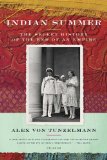Summary | Excerpt | Reviews | Beyond the Book | Readalikes | Genres & Themes | Author Bio

Critics' Opinion:
Readers' Opinion:
First Published:
Aug 2007, 416 pages
Paperback:
Sep 2008, 448 pages
 Book Reviewed by:
Book Reviewed by:
BookBrowse Review Team
Buy This Book
A Tryst with Destiny
On a warm summer night in 1947, the largest empire the world has ever seen did something no empire had done before. It gave up. The British Empire did not decline, it simply fell; and it fell proudly and majestically onto its own sword. It was not forced out by revolution, nor defeated by a greater rival in battle. Its leaders did not tire or weaken. Its culture was strong and vibrant. Recently it had been victorious in the century’s definitive war.
When midnight struck in Delhi on the night of 14 August 1947, a new, free Indian nation was born. In London, the time was 8:30 p.m.1 The world’s capital could enjoy another hour or two of a warm summer evening before the sun literally and finally set on the British Empire.
The Constituent Assembly of India was convened at that moment in New Delhi, a monument to the self-confidence of the British government, which had built its eastern capital on the site of seven fallen cities. Each of the seven had been built to last forever. And so was New Delhi, a colossal arrangement of sandstone neoclassicism and wide boulevards lined with banyan trees. Seen from the sky, the interlocking series of avenues and roundabouts formed a pattern like the marble trellises of geometric stars that ventilated Mogul palaces. New Delhi was India, but constructed—and, they thought, improved upon—by the British. The French prime minister, Georges Clemenceau, had laughed when he saw the new city half built in 1920, and observed: “Ça sera la plus magnifique de toutes ces ruines.”
Inside the chamber of the Constituent Assembly on the night of 14 August 1947, two thousand princes and politicians from across the one and a quarter million square miles that remained of India sat together on parliamentary benches. Yet amid all the power and finery, two persons were conspicuous by their absence. One was Mohammad Ali Jinnah, the leader of the Muslim League, who was in one of those parts of the empire that had just become Pakistan. His absence signified the partition of the subcontinent, the split which had ripped two wings off the body of India and called them West and East Pakistan (later Pakistan and Bangladesh), creating Muslim homelands separate from the predominantly Hindu mass of the territory. The other truant was Mohandas Karamchand Gandhi, who was sound asleep in a smashed-up mansion in a riot-torn suburb of Calcutta.
Gandhi’s absence was a worrying omen. The seventy-seven-year-old Mahatma, or “great soul,” was the most famous and the most popular Indian since Buddha. Regarded as little short of a saint among Christians as well as Hindus, he had been a staunch defender of the British Empire until the 1920s. Since then, he had campaigned for Indian self-rule. Many times it had been almost within his grasp: in 1922, 1931, 1942, 1946. Each time he had let it go. Now, finally, India was free, but that had nothing to do with Gandhi—and Gandhi would have nothing to do with it.
In the chamber the dignitaries fell silent as the foremost among them, Jawaharlal Nehru, stepped up to make one of the most famous speeches in history. At fifty-seven years old, Nehru had grown into his role as India’s leading statesman. His last prison term had finished exactly twenty-six months before. The fair skin and fine bone structure of an aristocratic Kashmiri Brahmin was rendered approachable by a ready smile and warm laugh. Dark, sleepy, soulful eyes belied a quick wit and quicker temper. In him were all the virtues of the ancient nation, filtered through the best aspects of the British Empire: confidence, sophistication and charisma. “Long years ago,” he began, “we made a tryst with destiny. And now the time comes when we shall redeem our pledge; not wholly or in full measure, but substantially. At the stroke of the midnight hour, while the world sleeps, India will awake to life and freedom.” The clock struck, and, in that instant, he became the new country’s first prime minister. The reverential mood in the hall was broken abruptly by an unexpected honk from the back. The dignitaries jerked their heads around to the source of the sound, and a look of relief passed over their faces as they saw a devout Hindu member of the assembly blowing into a conch shell—an invocation of the gods. Mildred Talbot, a journalist who was present, noticed that the interruption had not daunted the new prime minister. “When I happened to spot Nehru just as he was turning away, he was trying to hide a smile by covering his mouth with his hand.”
Copyright © 2007 by Alex von Tunzelmann. All rights reserved.





The Funeral Cryer by Wenyan Lu
Debut novelist Wenyan Lu brings us this witty yet profound story about one woman's midlife reawakening in contemporary rural China.
Your guide toexceptional books
BookBrowse seeks out and recommends the best in contemporary fiction and nonfiction—books that not only engage and entertain but also deepen our understanding of ourselves and the world around us.